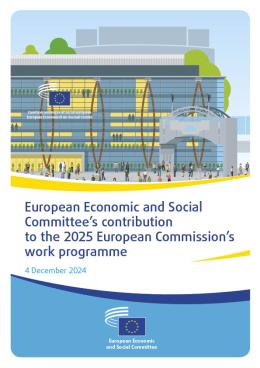European Economic
and Social Committee
EESC calls for a bolder and more inclusive EU Work Programme
As the European Union undergoes significant transformation, the European Economic and Social Committee (EESC) plays a key role in evaluating and influencing the European Commission’s 2025 Work Programme, which outlines the EU’s legislative and policy priorities. During its plenary session, the EESC discussed these priorities with Valdis Dombrovskis, European Commissioner for Economy and Productivity, emphasising economic resilience, social equity and sustainability.
In December 2024, the EESC presented its contribution to the 2025 Work Programme, Moving Forward Together: A Bolder, Simpler, Faster Union. As the first Work Programme under the new Commission mandate, it is crafted to tackle the EU’s economic and geopolitical challenges. Each year, through consultations and recommendations, the EESC works to refine the Work Programme, ensuring that it best serves the needs of European citizens and businesses.
EESC president Oliver Röpke welcomed the strong collaboration with the European Commission, marked by a record number of opinions requested in the coming months. He acknowledged the Commission’s efforts that are mirrored in its Work Programme, while at the same time calling for a more ambitious and inclusive approach. ‘We remain committed to shaping policies that promote economic stability, social equity and democratic values,' he said.
Commissioner Valdis Dombrovskis said that ‘The European Commission’s work programme for the next five years responds to the challenges ahead, and seeks to increase security and boost economic competitiveness. Europe needs to further develop our economic base by adapting, innovating and competing effectively in the world. Taking action to cut red tape, as set out in the Commission’s work programme, is an important element of building this more competitive Europe. Our simplification agenda is about making sure that our rules help deliver – rather than impede – the achievement of our economic, social, environmental and security goals.'
Economic growth and competitiveness
The Work Programme focuses on structural reforms, the new Multiannual Financial Framework (MFF) and strengthening capital markets. However, the EESC calls for a more comprehensive approach to economic resilience, addressing low growth, the cost-of-living crisis and rising geopolitical tensions. The EESC stresses the need to focus on a fair, sustainable economic transition and reducing inequality. While the Commission’s initiatives support this, the EESC calls for bolder actions to ensure long-term stability.
Regulatory simplification
The Work Programme aims to streamline EU regulations and reduce administrative burdens. The EESC welcomes this but points out that simplification should not compromise social welfare or environmental standards. The Commission’s Omnibus Package is a positive step, but the EESC encourages greater focus on the real-world impact of these changes on businesses and individuals.
Stefano Mallia, president of the EESC Employers’ Group, explained that ‘Our economy has for too long been undermined by excessive regulation and fragmented markets. Now there is a positive shift, but the pace of implementation must match the urgency of the challenge. 60% of EU businesses, even in the defence sector, still see excessive legislation as an obstacle to scaling and investing. We call on the Commission to truly deliver on the simplification revolution as EU businesses cannot wait any longer.'
Innovation and investment
The Work Programme prioritises digital networks, AI and quantum technologies. The EESC supports these goals but urges the Commission to create conditions that prevent capital outflows and encourage long-term investment in the EU. Initiatives like the Savings and Investment Union are important, but the EESC calls for more private investment to foster innovation.
Social and environmental sustainability
The Work Programme addresses issues such as skills shortages, food security and sustainable finance. The EESC asks the Commission to ensure that these initiatives support social cohesion and the digital transition. While the Corporate Sustainability Reporting Directive is a positive step, the EESC stresses the importance of ensuring that the green and digital transitions benefit all Europeans.
Lucie Studničná, president of the EESC Workers’ Group, commented that ‘Out of a total of 51 initiatives in the Work Programme, only three directly target social issues. Where is the social compass to lift 95 million Europeans out of poverty, to end the job insecurity affecting 25% of young people and to tackle the 30% increase in house prices over the last five years? European competitiveness will only be a reality if it translates into a decent life for all, if we guarantee quality jobs, decent wages and affordable housing.'
Enlargement and future readiness
The Work Programme outlines the EU’s readiness for future enlargement, focusing on financial and political stability post-2028. The EESC encourages the Commission to incorporate civil society perspectives and ensure that policies meet the needs of all Europeans. While supporting the Commission’s goal of enhancing EU competitiveness, the EESC emphasises that enlargement must include strategies for social integration and economic cohesion.
Rudolf Kolbe, vice-president of the EESC Civil Society Organisations’ Group said that ‘We welcome the release of the EU Preparedness Union Strategy and its aim of building resilient and self-organised societies. Security and crisis preparedness go hand in hand. Every euro that governments cut from democracy-building costs much more in military spending. Therefore, the EU Preparedness Strategy and the EU Civil Society Strategy must be closely coordinated and complementary. The EESC is ready and willing to help the Commission make both ambitions a reality.'
The EESC is dedicated to working with the Commission to ensure that the Work Programme addresses both immediate challenges and the long-term objective of a resilient, inclusive and sustainable EU. For 2026, the Commission has requested seven exploratory opinions from the EESC. The 2026 Work Programme will be published in October 2026, and the EESC aims to adopt its contribution by June.

